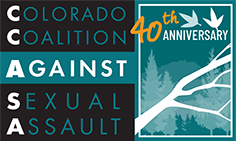By Zach Rawlings, CCASA Guest Blogger
Last month a Denver paramedic, Debbie Kibel-Crawford, committed suicide shortly after she had responded to an accident where a train had hit and killed a pedestrian. Members of her family reported that the cause of her death was due to the overwhelming stress of her job.
This heartbreaking story illustrates a rarely noticed or discussed fact about trauma: it can deeply affect us even when the traumatic event did not directly happen to us. In a previous blog, I spelled out the specific ways trauma impacts the brain and our behavior. However, many people believe that they can only experience the impacts of trauma if they have been directly victimized by something distressing. Many people who have been involved in something traumatic, but did not personally experience it, do not view what they are dealing with as stressful enough to warrant any type of intervention. This was most likely the case with Crawford.
Someone who encounters traumatic events in their everyday job may not have reason to believe they could be suffering from post-traumatic stress disorder. The stress that Crawford felt at work was an expected part of her occupation, so how could it warrant alarm?
This is one of the biggest misconceptions about trauma. Trauma conjures up ideas of a direct event occurring to us such as a sexual assault, a physical attack, or being involved in the military or a war. However, this is an incomplete understanding of how it works. Unfortunately, there is a mismatch between what the brain flags as traumatic and what our societal or cultural ideas tell us is traumatic. The brain registers many more events as stressful than the world around us does.
The psychological phrase most commonly used to describe situations like Crawford’s is ‘secondary trauma.’ Secondary trauma is not a diagnosis in the Diagnostic & Statistical Manual for Mental Disorders, so many do not consider it a “real” problem. However, folks like the surviving members of Crawford’s family will adamantly tell you otherwise. And research has proved consistently that secondary trauma symptoms can be found in people working in fields that require them to see stressful things every day (e.g. firemen, paramedics, nurses, etc.). Many of the folks who work in these fields, however, do not believe what they are doing is traumatic. But their brain disagrees, and PTSD symptoms usually emerge (NCTSN, n.d.).
It’s important to recognize that trauma can take on many forms, and it can affect us in a variety of ways. Being a “classic victim” is not the only way that trauma can impact someone negatively. There are a multitude of stressful jobs in which “everyday tasks” have the potential to produce PTSD:
- Assisting people who are in distress like most cops and firemen do each day
- Taking difficult phone calls all day long and listening to complaints in a customer service industry
- Being a nonprofit worker who works with individuals with painful backgrounds of neglect or abuse
- And, as in the case of Crawford, working as a medical professional where death can be an everyday reality
Take a check of your mental health if you think you work in a field that is exceedingly stressful. Here are a few questions to ask yourself when considering whether or not you may be experiencing secondary trauma:
Do I have difficulty separating my work from my personal life?
Do I ruminate on stories or events I have heard or seen during my workday when I am not at work?
Do I dread going to work because of what may happen while I am there?
Do I feel increasingly more disconnected from my coworkers or loved ones?
Do I sometimes feel my job is more than I can bear?
Are my friends ever concerned about me because of my job?
If you answered yes to several of these questions, you may be experiencing secondary trauma. To learn more about secondary trauma and its effects visit here. Or if you decide you would like to take some steps to address some of your symptoms, shoot me an email. I would love to help you brainstorm as you figure out ways to get your mental health back on track.
Connect with Zach at zachrawlings.com.
Sources
- “Denver medic’s family says stress of job contributed to suicide”. (2015). Retrieved from http://www.ems1.com/ems-advocacy/articles/2109124-Denver-medics-family-says-stress-of-job-contributed-to-suicide.
- The National Child Traumatic Stress Network. (n.d.). Secondary traumatic stress. Retrieved from http://www.nctsn.org/resources/topics/secondary-traumatic-stress.
Image Source: Photograph by Molly Boeder Harris at www.thebreathenetwork.org.

